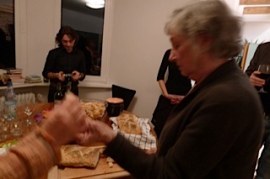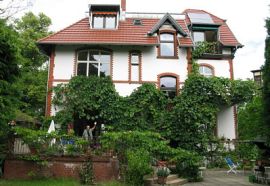Making Berches in Berlin
Last month I spent time in the gorgeous old neighborhood of Lichterfelde in Berlin. Very substantial three story buildings erected by a thriving bourgeoisie in the first decade of the 20th century. I was there to conduct a mediation training with my colleagues and friends Dirk and Ljubjana at their institute Inmedio. One of the evenings the trainers, some friends, and mediation trainees gathered for a “Fireside Chat” – an evening event they hold regularly. That evening I was making a presentation about our German-Jewish food project, a topic that loosely fits into one of the themes that preoccupies the Institute, the theme of dialogue. Speaking to a young German audience about the food culture of Jews who were historically German becomes an exploration of the interconnectedness between German-Jews and Germans. Dialogue is built into this conversation.

 [ left: Gaby speaking with the group; right: Ljubjana and Gaby [photos courtesy: Cynthia Petrigh]
[ left: Gaby speaking with the group; right: Ljubjana and Gaby [photos courtesy: Cynthia Petrigh]
Germany has done a good job of teaching the Holocaust, perhaps too good. Sitting before me was a group of progressive people, all pursuing socially aware professions, whose vision of a Jewish person is inextricably connected with genocide committed by their ancestors. Most of them do not personally know any Jews. I was telling them that, although the Jewish community disappeared from Germany, a minority of us survived elsewhere, scattered across the globe. In my case, it was the 20,000 member German-Jewish community of Washington Heights in Manhattan where I grew up – which was large enough to continue the food culture of the old country. In addition, there were thousands more refugees from German-speaking Europe scattered around the New York area, with concentrations in the Upper West Side of Manhattan and Queens.

 left: Gaby slicing and serving Berches; right: eating Berches [photos courtesy Cynthia Petrigh]
left: Gaby slicing and serving Berches; right: eating Berches [photos courtesy Cynthia Petrigh]
I showed a Power Point presentation of images of German-Jewish life in New York in the 1940s, 50s and 60s. And I spoke about the food, touching upon Jewish food traditions such as Kosher law and special dishes for Shabbos and holidays. And also about German dishes that were tweaked to conform to Jewish law. Today, Jewish food in Germany is represented by Jews who have settled there post-war – primarily from Eastern Europe – whose food is quite different from that of the Jews of Germany before the war. I was speaking not only about Jewish cooking, but specifically German-Jewish Cooking. This was something that was hard for them to wrap their heads around because it virtually stopped existing in Germany after the war. That is one of the main reasons why Sonya and I are working on this project, to bring recognition of this food tradition and its culture back into the world.
I had baked two loaves of Berches the day before in Dirk and Ljubjana’s large kitchen overlooking the wooded garden (Berches is the German-Jewish version of Challah – a braided ceremonial bread made without eggs, often including potatoes in the dough). The bread was to be served with other foods as part of a cold buffet after my presentation. But before we began eating, I decided to make a traditional Friday night prayer over the bread. I said the brucha and then tore some of the bread into small pieces and handed it out to everyone. I wanted to emphasize the blessed nature of this bread, whose very name Berches is said to derive from the Hebrew word for blessing, Baruch. I explained that this bread was not only eaten during Jewish holidays, but also every single week during Shabbos. Then I sliced the bread and we all ate it with the accompanying spread of cheeses, cold cuts, hummus, guacamole, olives and grapes. Everyone thought the Berches was delicious and I received many “thank you’s” at the end of the evening for introducing people to this forgotten taste and tradition.
Note: unfortunately I did not get any close-up photos of the Berches I made in Berlin. The shot above is of a Berches I made in October in a bread pan – it is unbraided, but made of the same dough.
-Gaby




Pingback: Berches, a recipe « German-Jewish Cuisine —
Too many poppy seeds for my taste!
Marion: If I remember correctly, you like sesame seeds on your Berches. That sounds like a great taste. You are talking to fans of the traditional poppy seed treatment, though we would like it your way too. Next time you bake, would you send us a picture?